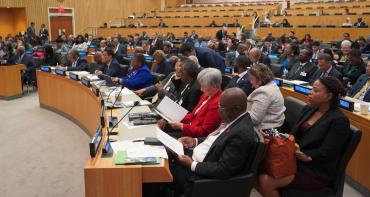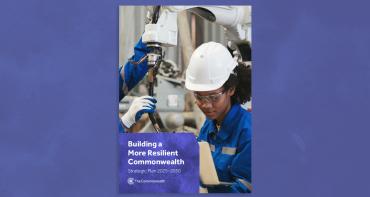Commonwealth Champions Against Child Marriage seeks to empower survivors to raise awareness and galvanise action to end child marriage.
Mobilising Traditional Chiefs to End Child Marriage in Malawi Version 2
“I lost both my parents and had no one to take care of me…In an environment where cultural beliefs are high, I found myself being forced into marriage…at the age of 13.”
Enala Ngulu from Malawi, now aged 36, was addressing an audience at a special session on child, early and forced marriage, taking place ahead of the Commonwealth summit.
Ms Ngulu is part of a new initiative announced today - Commonwealth Champions Against Child Marriage - which seeks to empower female and male survivors to raise awareness and galvanise action to end child marriage. The programme will provide participants with resources to take on innovative advocacy roles.
Ending child marriage is an urgent imperative. It is estimated that over the next decade 140 million girls under the age of 18 years will be forced to marry without their consent. This amounts to a rate of 39,000 girls every day. Half of these girls live in the Commonwealth.
Acknowledging the severity of the situation, Commonwealth leaders issued a specific mandate to prevent and end child marriage at their meeting in 2013. They will review progress at this year’s summit.
“We are failing our children and young people as long as child marriage continues. Our commitment to gender parity is seriously flawed when we cannot protect their childhoods. It is time for governments, parliaments, traditional and religious leaders, civil society, national human rights institutions and parents to do more to protect our children, and who better to bring this issue into sharper focus than survivors,” said Karen McKenzie, Head of Human Rights at the Commonwealth Secretariat.
“The Commonwealth Champions Against Child Marriage has been established to give survivors a voice, to empower them to take on innovative advocacy and mobilisation roles, and to place them at the centre of our programmatic work,” she added.
Child marriage is a human rights violation. The removal of children from education to prepare for or to enter into an early and forced marriage severely impacts upon further development. It denies individuals the right to enjoyment of safe and consensual sexual relations. It takes away the choice to become pregnant and severely compromises the capability to bear healthy children.
Madalitso Mwaungulu, aged 22 from Malawi, also part of the Commonwealth Champions Against Child Marriage, shared his story and pointed out that this is not an issue that only affects girls and young women.
“Many of you here today still believe that boys and men are the beneficiaries and women and girls the victims. When I was 14, like any other boy child my age, I had to undergo a rite of passage called ‘Chinamwali’. For three to four weeks I was confined within a forest with no access to any other people. I was singled out by the elders to set an example…a girl had been identified for me…I decided to run away from the village,” he said.
Speaking at the first ever Commonwealth's Women's Forum, at a special session on ending child, early and forced marriage, Commonwealth Deputy Secretary-General Josephine Ojiambo said she was proud of the lead Commonwealth National Human Rights Institutions (NHRIs) have taken in addressing the issue.

She said: “This year national human rights institutions met in Rwanda and agreed to and adopted the Kigali Declaration. The Declaration represents a united stand on child marriage and sets out a framework of NHRIs to strengthen their efforts in ending the practice in their respective countries.
"NHRIs are well placed to conduct human rights education, run enquiries, receive individual complaints, provide redress to victims and be the bridge between civil society and government.”
The Women’s Forum outcome document, which will be handed to leaders at the Commonwealth Heads of Government Meeting this weekend, acknowledged the impact of child, early and forced marriage on development in the Commonwealth, “and the consequences on the rights of women and girls”.
It “urged member states to continue to raise awareness of gender-based violence, highlight support available to survivors and reference the issue of holding perpetrators accountable.”
It also encouraged partnerships with national and regional human rights institutions, traditional leaders, as well as survivors of child, early and forced marriage through the Champions Against Child Marriage platform.
Image

|
Image

|
Image

|
| About the Commonwealth | CHOGM Image Library | Commonwealth summit |



